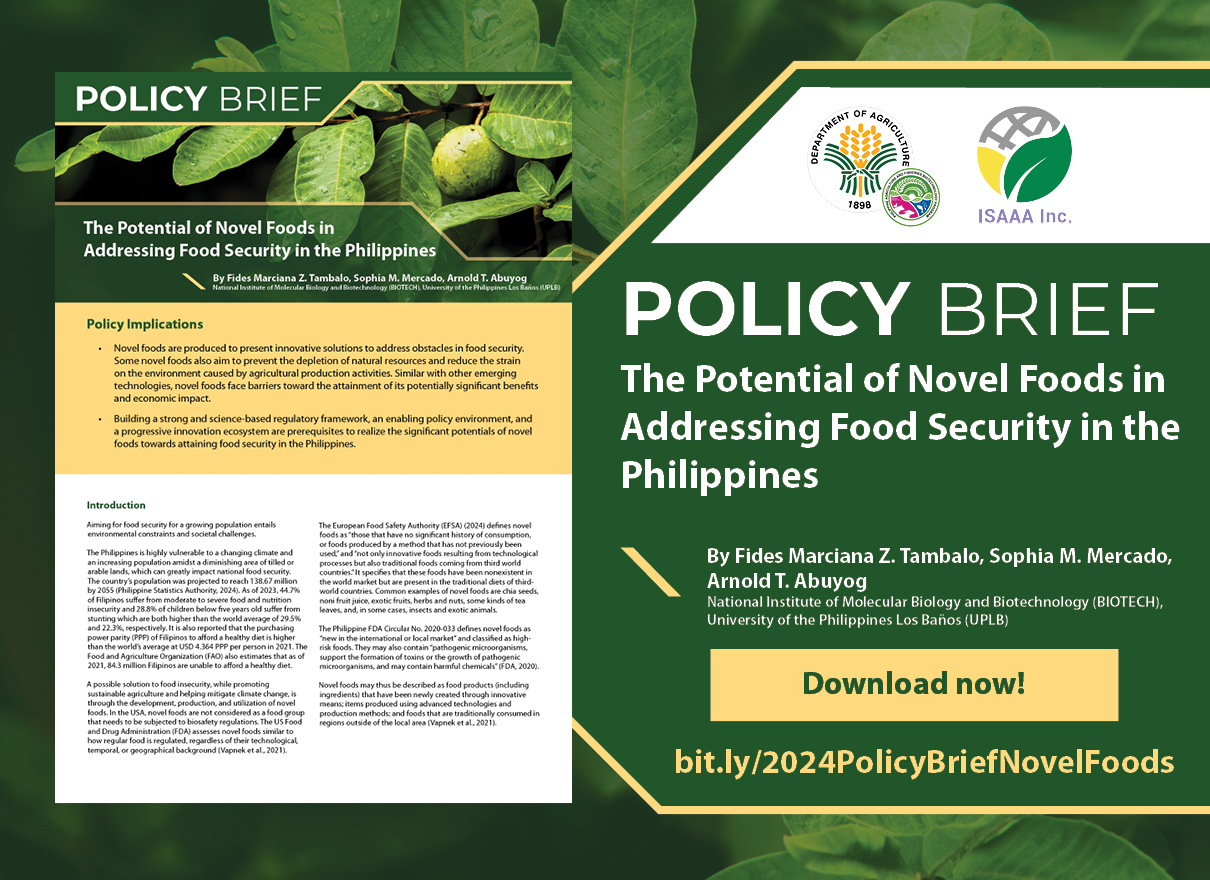ISAAA Inc., DA BPO, and UPLB-BIOTECH Release Policy Brief on Novel Foods and Sustainability
| |
ISAAA Inc., in collaboration with the Philippine Agriculture and Fisheries Biotechnology Program of the Department of Agriculture (DA Biotech Program), publish a policy brief titled The Potential of Novel Foods in Addressing Food Security in the Philippines. The policy brief is authored by Dir. Fides Marciana Z. Tambalo, Ms. Sophia M. Mercado, and Mr. Arnold T. Abuyog of the University of the Philippines Los Baños - National Institute of Molecular Biology and Biotechnology (UPLB-BIOTECH).

The notion of novel foods is not new as noted by the European Food Safety Authority (EFSA). According to EU regulations, any food that was not widely consumed before May 1997 is classified as a novel food. “The category covers new foods, food from new sources, new substances used in food, as well as new ways and technologies for producing food,” EFSA states. A few examples of novel foods identified by EFSA are chia seeds, a non-sticky chewing gum base, milk products fermented with B. xylanisolvens, and lycopene from B. trispora.
Novel foods introduce new and efficient food sources that can help contribute to more resilient and sustainable food systems. As the world grapples with the challenges of climate change and a growing population, food production necessitates alternative food sources derived from new methods and innovations, such as lab-grown proteins, plant-based substitutes, and foods developed through biotechnology.
The policy brief titled The Potential of Novel Foods in Addressing Food Security in the Philippines discusses molecular farming for novel food components, novel food from new sources and traditional food, and challenges to the adoption of novel food products. Products developed by UPLB-BIOTECH, such as microbial enzymes, microbial rennet, MONASCUS RED® food colorant, probiotic guava leaf-based beverages, and Proculant™, were also explained in the policy brief.
Molecular farming for novel food components
Molecular farming refers to the process of transforming ordinary plants and food to produce high-value products or more desirable forms of food. Some of the start-ups in molecular farming include Nobell Foods, Moolec Science, Mozza, and ORF Genetics. Nobell Foods develops plant-based dairy products that resemble the taste and texture of their animal-based counterparts. Meanwhile, Mozza is developing plants engineered to produce mozzarella cheese proteins. Moolec Science, on the other hand, focuses on integrating animal protein genes into plants to produce dairy and meat proteins directly in these crops, and lastly, ORF Genetics makes use of barley plants to produce growth factors that are used in the cultivated meat industry.
Food from new sources and traditional food as novel food
EFSA recognizes traditional foods as a subset of novel foods. This includes a range of foods derived from plants, microorganisms, fungi, algae, and insects, as well as foods traditionally consumed outside the EU. As of 2024, 29 algae species are already being used as a food source or food ingredient, while six microalgae species have been considered as novel food. In 2023, four insect species were authorized by the European Commission as novel foods, and in 2024, the Singapore Food Agency approved 16 insect species for consumption. This data signifies that there has been a growing interest in insects as an alternative food source to traditional meats.
UPLB-BIOTECH has also been developing products that may be considered novel foods or inputs in the production of novel food. Their products include producing microbial enzymes for the food and beverage industry, microbial rennet as an alternative to commercially available rennet, MONASCUS RED® as an alternative petroleum-based food colorant, probiotic guava leaf-based beverages, and Proculant™ as a microbial starter culture for probiotic foods. These innovations collectively aim to address food and nutrition challenges through alternative and sustainable food solutions.
Challenges to the adoption of novel food products
The Philippines has an established, science-based approach to risk assessment and management, following international biosafety standards. However, opposing views and opinions continue to delay and hamper the development and adoption of products derived from modern biotechnology. Psychological barriers, such as food neophobia (i.e., fear of new things), unfamiliarity, and lack of knowledge, also contribute to these challenges. On top of that, research and development require significant financial investment to produce novel foods in the country.
In light of these considerations, the brief provided the following policy recommendations:
- Strengthen collaboration among academe (research institutes), industry, and government offices (regulatory and funding agencies, policymakers) on the development and implementation of strong, science and product-based policy considerations applicable to novel foods that would highlight their nutritional and economic benefits.
- Foster a shared understanding among the regulatory agencies and policymaking bodies through scientific information, education, and communication towards an enabling policy environment for novel foods.
- Facilitate a thriving innovation ecosystem where both knowledge and market economies mutually support each other through incentives for researchers and innovators, funding support for public research institutes, and streamlined technology transfer processes, among others.
The policy brief on novel foods and sustainability is an addition to the Know the Science Policy Briefs intended for distribution to the committees in the House of Representatives. This series intends to promote a favorable regulatory environment for the commercialization of biotech products.
Download The Potential of Novel Foods in Addressing Food Security in the Philippines to know more. Read the following briefs for more information:
- Beyond the Label: Unpacking the Lessons of GM Food Labeling Policies
- Advancing Philippine Agriculture: Strategic Framework for the Commercialization of Biotech Innovations
- Accelerating Impact Through a Responsive Regulatory Framework: the DOST-DA-DENR-DOH-DILG Joint Department Circular No. 1, Series of 2021
| Newer Post | Archive | Older Post |
Science Speaks is ISAAA Inc.'s official blog. Weekly blog articles, authored by ISAAA writers, partners, and invited contributors, aim to help share, disseminate, and promote scientific knowledge and its vital role in achieving global agricultural sustainability and development. Your support to Science Speaks will help us achieve this goal. You can help us by donating as little as $10.

